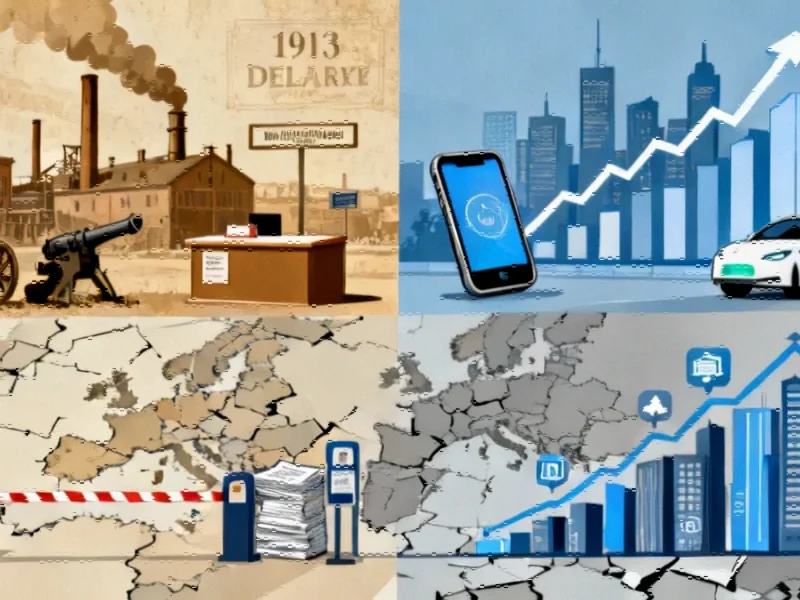The Delaware Blueprint: America’s Secret Weapon
In 1913, Delaware made a strategic decision that would ultimately reshape global business landscapes. As neighboring New Jersey tightened corporate regulations, Delaware positioned itself as a business-friendly haven by creating simplified registration processes and reducing bureaucratic hurdles. What began as an effort to attract steam engine and gunpowder manufacturers evolved into the foundation supporting today’s most transformative technologies—from smartphones to electric vehicles. The “Delaware Inc” model became America’s corporate vehicle for innovation, providing a unified legal framework that enabled seamless scaling across state lines.
Europe’s Scaling Crisis: The $30 Trillion Gap
The contrast between European and American startup ecosystems reveals a staggering disparity. According to research cited by MIT’s Andrew McAfee, publicly traded companies founded in Europe over the past 50 years collectively reached approximately $420 billion in value. Meanwhile, their American counterparts soared to nearly $30 trillion—a 70-fold difference. While the U.S. produced six companies with market capitalizations exceeding $1 trillion during this period, Europe produced none. This gap isn’t reflective of European entrepreneurial talent—companies like Adyen, Spotify, and Revolut demonstrate Europe’s capacity for global innovation—but rather systemic barriers preventing these successes from becoming the norm rather than the exception.
The fragmentation extends beyond corporate structures to affect broader economic dynamics and resource allocation across the continent. European companies must navigate 27 different regulatory environments, each with distinct corporate laws, employment codes, and tax structures. A founder expanding across Europe faces the monumental task of establishing separate legal entities in each country, reconciling conflicting regulations, and explaining to employees why their stock options differ between Madrid and Munich.
The Single Market Myth: Europe’s Invisible Borders
Despite political rhetoric about European unity, the startup ecosystem operates as 27 distinct markets rather than a cohesive whole. This fragmentation creates what Mario Draghi, former Italian Prime Minister and European Central Bank President, identified in his landmark report as a critical threat to EU competitiveness. Draghi called for an additional €800 billion annually in investment, noting that Europe captures just 5% of global venture capital while the U.S. commands 52%. Venture capital investment in the EU represents just 0.05% of GDP—nearly six times lower than the 0.32% seen in the U.S.
More than 60% of European companies identify regulation as their primary obstacle to investment, with most considering it their most significant challenge overall. This regulatory complexity affects not only traditional businesses but also emerging sectors, including critical infrastructure development and energy projects that require cross-border coordination.
EU-INC: The Movement for Corporate Unification
The proposed solution gaining momentum is EU-INC—not merely a copy of the Delaware model but a modern, pan-European corporate entity designed to set new global standards for business formation. This framework would enable founders to incorporate once and operate seamlessly across all member states, accessing standardized investment documents, implementing EU-wide employee stock options, and scaling across 450 million consumers without legal fragmentation.
The grassroots movement behind EU-INC has attracted over 18,000 signatories and support from Europe’s most successful entrepreneurs and investors, including leaders from Mistral, DeepMind, Stripe, Supercell, Index Ventures, and Y Combinator. The initiative has gained approval from major EU decision-making institutions, with European Commission President Ursula von der Leyen committing to reform.
This push for unification aligns with broader efforts by European business leaders to create more competitive corporate structures that can rival global counterparts. The proposed changes would address fundamental scaling challenges while creating a more attractive environment for international investment.
The Innovation Exodus: Europe’s Silent Crisis
Europe faces a critical juncture. The continent that contributed fundamental research leading to the internet now risks watching as American companies leverage unified systems to scale with unprecedented efficiency. The consequences extend beyond startup formation to affect major industrial projects and technological advancement across sectors.
Current discussions in Brussels about incremental measures—harmonizing certain national laws or creating additional frameworks—fail to address the core problem. Fragmentation requires a fundamental solution at Europe’s institutional heart, not piecemeal adjustments that maintain the status quo while creating the illusion of progress.
The Global Context: Beyond Corporate Structures
Europe’s corporate fragmentation challenge exists within a broader global landscape of technological transformation. As businesses worldwide adapt to new realities, including the emergence of innovative applications of artificial intelligence and digital tools, the need for agile corporate structures becomes increasingly urgent. Meanwhile, financial institutions are making significant investments in technological infrastructure that could reshape global finance.
These parallel developments highlight how corporate structure reforms intersect with broader geopolitical and economic trends affecting business competitiveness. Europe’s ability to compete in emerging sectors depends not only on technological innovation but also on creating the legal and financial frameworks that enable that innovation to scale.
The Path Forward: From Fragmentation to Unity
Delaware’s century-old gamble demonstrated how strategic regulatory frameworks can catalyze economic dynamism. Europe now stands at a similar crossroads, with the opportunity to create what could become the world’s most sophisticated corporate vehicle—EU-INC. By addressing fragmentation at its core rather than through superficial measures, Europe can transform from a collection of competing jurisdictions into the world’s premier environment for founding, funding, and scaling companies.
The continent doesn’t need another directive or committee—it needs a fundamental restructuring of its corporate landscape. With political will and entrepreneurial momentum aligning, Europe has the opportunity to build not just its own Delaware, but something potentially superior: a unified corporate framework designed for the 21st century global economy.
This article aggregates information from publicly available sources. All trademarks and copyrights belong to their respective owners.
Note: Featured image is for illustrative purposes only and does not represent any specific product, service, or entity mentioned in this article.



